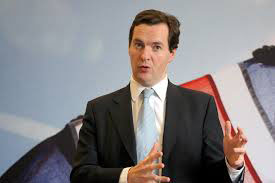Ossie's Statement - Down to Earth but No Easy Way Out

27 November 2015 | Updated 01 January 1970
Chancellor George Osborne presented his autumn statement and spending review with a juggling of figures that will continue to be analysed for what real impact that will be made by the cuts he is making than the opportunities he is creating, writes Mike Gannon.
There were two rabbits that Chancellor Osborne pulled out of his hat in his autumn statement – not removing tax credits and not cutting police forces but his other commitments showed his resolution to achieve a surplus will mean substantial cuts in public sector spending that will see a massive change in the running and existence of facilities there.
How great the pain will be is difficult to judge and as ever, it will only be by pouring over the details that a truer idea will emerge about how this will affect the FM sector. The first apolitical body to weigh in with warnings that more pain is to come was the Institute of Fiscal Studies (IFS) and its observations that despite certain protected areas like the NHS and education, other government departments would be left bloodied.
As the IFS had noted prior to the autumn statement: ‘Between 2010–11 and 2014–15, departmental spending was cut by 9.1%, compared with a 2.4% increase in non-departmental spending. Within departmental spending, health, schools and official development assistance have been protected, while other areas have been cut dramatically.’ As we now know, some cuts have not taken place; at least not for now but as Paul Johnson, Director, IFS stated in the wake of the autumn statement: “This is not the end of austerity. This spending review is still one of the tightest in post-war history.”
Certain government departments have had their operational spending savaged. The Department for Transport, for example, has seen has suffered the biggest cut of any government department with its operational budget reduced by 37% and with savings of £1.8 billion by 2020. However, set against that is a potentially huge commitment to capital projects like HS2. “Transport capital spending will increase by 50% to a total of £61 billion – the biggest increase in a generation,” said Osborne.
While grandiose projects capture the headlines, spending on roads that most of us currently travel on remains inadequate. Osborne’s announcement that there will be a new £250 million fund to ‘fix potholes’ was dismissed by the RAC as a drop in the ocean. It estimates there is an estimated £8.6 billion required to repair local roads that constitutes the biggest proportion of our highways.
In his robbing Peter to pay Paul mode, Osborne went ahead and slashed Transport for London’s resource grant which will end in 2019, costing £2.8 billion or 6% of its annual budget. He argued that by “efficiency savings” and property sell offs TfL would achieve this but London’s Mayor, Boris Johnson was on the blackfoot when pressed whether above inflation fare rises would have to make up any shortfall.
Departmental cuts
Just as the devil is in the detail there is no doubt that the losers will be government departments deemed to lie outside protection.
The Ministry of Justice, for example, will have to live with overall resource savings of 15% and a 50% cut in the department’s administrative budget. The selling off of facilities will be one of the options along with deferment of refurbishments. While saying the government remained committed to climate control, Osborne predicted that the DECC’s “day to day resource budget will fall by 22%”. Another department is DEFRA and again the Chancellor estimated that day to day budget falls by 15% in the spending review.
FM responses
Speaking to TWinFM, Linda Hausmanis, Director of Education, BIFM, responded to two questions on how the spending review might have an impact on its corporate members in the public sector and for its individual members.
“With regards to the cuts, again this creates an even more challenging environment for the public sector and the supplier partners that work with it to operate within a framework of conflicting drivers cost versus quality, increasing the difficulty to focus on long term value delivery over short term cost savings. That we all know in the long run is a false economy and can cost more to the country. We’ve seen exemplary partnerships at our Awards between the public sector and FM providers where the shared pursuit of delivering value impacts on the quality of outputs whilst saving money in the long run.
“An important factor to consider is the trajectory of the cuts over the next three-five years to the end of the next parliament, particularly looking at the impact that could be made on the delivery of local services. For example, when considering the delivery of services we can expect local authorities to continue to look at leaner business models, e.g. increasing the opportunities and scope of outsourcing. There could be scope for a wide range of services falling under the external traditional FM umbrella; this all requires intricate collaboration models and mind-sets.
“It takes creativity, flexibility, high skill levels and a strong mind-set to operate in these conditions. Employers both in public and private sectors need to be thinking about how they develop strong and skilled workforces to deliver in these conditions.”
On the question of BIFM comments relating to individual members, either directly employed in the public sector or those in FM companies serving it, Ms Hausmanis stated: “For those working in the public sector faced with these increasingly difficult environments on either side of the partnership, it becomes increasingly difficult to maintain spirit and focus especially if we’re in a constant race to cut costs while the demand for quality of service remains. I urge everyone to focus on the value and how to deliver solutions creatively; focus on your development both in skills and knowledge and in building shared commitment and goals with those you work with in your business and in the partnerships to deliver these services.”
On the back foot
While there needs to be a thorough analysis of Osborne’s autumn statement over the coming weeks if not months, it is surprising that many FM big players appeared to be caught out by the ramifications for them when TWinFM contacted them for comment.
From initial contacts with a number of leading FM players there were a series of ‘not at all’ or ‘too soon to say’ responses from them.
A Mite spokeswoman said there would be a “minimal impact” and that it would continue to work in a closer relationship with local authorities to ensure any cost with them would be minimised.
Interserve was more guarded and the reply to TWinFM was that it was “too premature”.
OCS believed any impact would be limited.
Serco dismissed any adverse impact on its services to the public sector.
Picture: Chancellor George 'Ossie' Osborne
Article written by Mike Gannon | Published 27 November 2015



.gif)
.png)

.gif)

.gif)

.png)

.png)
.jpg)





.jpg)



